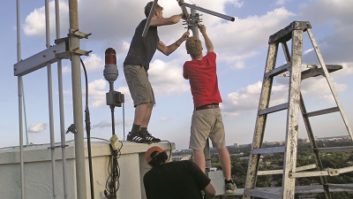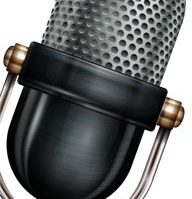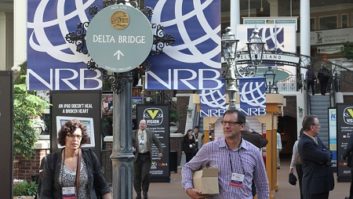Chuck Conrad’s quest to start a low-power FM and then convert it to full commercial FM status took more than six years, a period filled with challenges and rewards.
Prior to his entry into the radio business, he had been a peripatetic purveyor of touring sound equipment including wireless microphones. He noticed a strange phenomenon.
“It was a new digital television audio channel on one of the frequencies we commonly used for our wireless mics,” he said. “So I started paying attention to what the FCC was doing and eventually learned that there was a filing window for low-power FM coming up. I owned property in east Texas and knew there was a lack of decent radio out here. I checked the qualifications for LPFM owners and formed a non-profit organization.”

Chuck Conrad in the studio.
Conrad knew it was a community of only about 6,000 souls arranged around the largest private lake in Texas, and that would mean his future was tied to the fortunes of small-market radio. Fortunately, making major-market money was not his prime directive.
“I wanted to serve that area,” he said. “If there was a weather emergency I knew I could break in live and talk about it on the air. When there was a serious storm out here, no one on the dial had anything about it. It was all satellite and voice tracks, and I wanted to do something different.”
The LPFM construction permit was issued in 2003. KZQX(LP) hit the air the following year. Conrad had read that “Z,” “Q” and “X” were the most requested call letters, but nobody seemed to be using all three.
“I later discovered that those letters are incredibly hard to type and even harder for most people to remember in the right order,” he said.
Conrad developed a format consisting of music appealing to what used to be known as “old people.” Today’s demographers use the more euphonious appellation “baby boomers.” He was surprised to discover via phone calls and email from listeners that many young people in the area also enjoyed the sounds of Sinatra and Fitzgerald. The first years on the air were a financial struggle, but the community support grew each month.
“People would underwrite us or just donate money,” he said. “Some people just showed up at our door with records. Even local stations gave us stuff. Contrary to popular belief, most broadcasters are nice people. They thought we were cute, and certainly were no threat to them.”
But it was when Conrad persuaded some of his friends to apply for and eventually receive permission to put up three translators in 2004 that the little station’s audience increased dramatically.
“Longview, Texas has about 80,000 people and Kilgore has another 12,000, and we did a pretty good job of covering those,” he said. “One day someone from Arbitron called to say we were the first LPFM to show up in the ratings book.”
The big switch
Going commercial was the next hurdle, and luckily a frequency became available. KXAL(FM) was licensed to nearby Tatum, Texas and broadcast at 100.3 MHz.
“It had tried every format including the ‘dead air’ format,” said Conrad. “But the owners wanted to sell it to me because they knew I would not compete with them. The deal was consummated in 2009 and we are still friends with those folks.”
But according to the rules, Conrad had to divest himself of the LPFM, so he donated it to a local church. His new commercial FM was christened KZQX(FM) or “QX-FM” for short. It airs the same oldies/standards format as before, but now is pushing out 2,450 watts from atop a 500-foot tower, with a translator in Tyler, Texas. The LPFM he donated to the church took the call letters of the former commercial FM; it is now known as KXAL(LP).

‘The Q Mobile’ is a retro studio on wheels, made mostly of repurposed equipment and resembling a 1960s or early ’70s radio studio. Staffers Alexa Duke and Jim Allen are shown just before the doors open at the Rusk County Farm, Ranch and Home Expo in April.
Even though KZQX is now a commercial FM, it still serves a relatively small community and operates on an annual budget that would barely cover the cost of a catered lunch for the owners of some media biggies.
Conrad acknowledged that “nobody is getting rich doing this, but we aren’t having trouble meeting our obligations either. In fact, our cash flow has allowed us make substantial improvements in the station’s infrastructure.”
His goal is to offer affordable advertising to small local merchants. “Thinking small” is what allows his station to prosper.
“I have two employees, so it’s still small,” said Conrad. “You’ll hear all kinds of stuff on the station for community organizations, and our listeners actually like that. It’s one of the things we have to sell. We really are local.”
The station has now added a trailer, the Q Mobile, for public appearances.
“Most remotes done by other stations around here are just a guy with a card table and a cellphone giving away hotdogs at a car dealer,” said Conrad. “Our vehicle looks like a radio studio of days gone by, complete with turntables and cart machines.” (There is also a computer hidden under the console.)
Paul Anderson is senior vice-president of tourism at the Longview Chamber of Commerce. “We see Chuck at all our big events and festivals,” he said. “He comes to our business showcase and our boat show and AlleyFest every summer. I consider him a huge asset to our community.”

Conrad is shown at the 100.3 transmitter site, as the LPFM flipped its STL over to become a commercial FM. Most of the gear visible here has since been replaced, though the red QEI transmitter now does duty as a standby.
To LP or not to LP
He’s not completely sure, but Conrad believes he is the only operator to have made the conversion from LPFM to commercial FM. While he can’t say this with certainty, he spends a lot of time on a half-dozen LPFM discussion groups online.
“I have never heard of it happening,” he said. “I do know a couple of instances where the principals involved shut down or transferred the LPFM license and moved to the land of commercial radio in another market.”
When he first considered the idea of getting translators for his fledgling LPFM, he had no idea if that was even possible.
“I couldn’t find anything in the FCC rules that precluded it, so I encouraged my friends to apply under the theory that ‘if you don’t apply, you certainly won’t get it.’ The worst the FCC could say was ‘no.’ They said ‘yes.’”
Radio World asked Conrad if he thought others could make the leap from LPFM to commercial FM.
“It’s possible,” he said. “Most LPFMs have a hard time staying on the air due to their usually very limited budgets. Often they reason that if only they could sell commercials, that would fix everything. It doesn’t. It just changes the rules. I’ve found that the cost of doing business goes up by a factor of nearly 10 including music licensing and power bills.”
Conrad also cited the increase in the number of hoops through which a licensee must jump in the commercial arena.
“Public file requirements don’t apply to LPFM but they certainly do for commercial broadcasters,” he said. “You will need a bigger staff, and they’ll want to be paid. These days radio is not a way to get rich quick. Now that the feeding frenzy of consolidation and dismemberment seems to be over, the best way to make money in radio broadcasting is to actually earn it.”
Not for the faint of heart
One of the challenges he sees for LPFM is the inherently weak signal.
“During some times of the year, tropospheric ducting renders many of these stations nearly useless. One hundred watts at the equivalent of 100 feet simply isn’t enough to do the job,” he said.
“It would be more reasonable to make the technical requirements for LPFM the same as those for translators. In fact, allowing translators to originate local programming might go a long way toward the commission’s goal of having more local programming options available.” But technical issues are only part of what the low-power broadcaster faces, according to Chuck Conrad.

Sparky barked at the end of a ‘Pet of the Week’ PSA and ended up with a radio following for a couple of years. ‘Maybe I should put him back on the air,’ Conrad said. ‘He works cheap.’
“Staffing can be a real problem,” he said. “Many LPFMs are operated by activist groups, and some are quite successful at being true community stations. Usually volunteers get involved with a lot of enthusiasm, but they can burn out quickly as life’s realities seem to get in the way. It takes a lot of managerial skills to pull that off for any length of time.”
But the biggest headache for LPFMs comes down to money.
“It’s about not going broke,” he said. “Most stations either lose money or barely break even. Selling underwriting on a station that is difficult to receive is a very real problem.It’s probably why so many LPFMs are owned by churches and are little more than satellite-fed translators for a network.”
Conrad is a fan of LPFM broadcasting but says the concept arrived “as a very crippled newborn” thanks to unrealistic power limitations, third-adjacent-channel restrictions, congressionally mandated rule changes and vague underwriting regulations. More low-power FMs are on the horizon now thanks to recent FCC actions, including the easing of interference restrictions, “but finding frequencies, especially in urban areas, is still going to be difficult if not impossible,” he said.
“The big questions remain. Will the same filing requirements apply to this round? When will the filing window open? I’m guessing sometime in 2012, but I think the FCC should deal with the remnants from the Great Translator Invasion first,” Conrad said. “People who applied almost 10 years ago deserve an answer from the commission, even if it is a ‘no.’”
In any event, anyone hoping for an LPFM should be laying their ground work now. “It takes a lot of patience and perseverance.”
Ken Deutsch says his first paying DJ gig was at an FM country station that styled itself as the “Home of the Jones Boys.” His air name was Ken Jones. With counseling he has made a full recovery.









